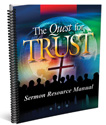Text: Exodus 20:1-17
Trust is basic to the well being of all human relationships and institutions. Trust is about the proper use of power. When power is properly exercised leaders are deemed to be worthy of trust. A breach of trust occurs when power is abused.
A culture of trust must be built upon the foundation of covenant with God, and the human community.
- A proper relationship with God is expressed in a proper relationship with others. The building blocks of covenant community are:
- Honoring parents and elders (Exodus 20:12; 1 Timothy 5:1).
- Reverence for human life (Exodus 20:13; Matthew 5:21-25).
- Fidelity to the marriage covenant (Exodus 20:14; Matthew 5:27-32).
- Respect for the property of others (Exodus 20:15, 17; Ephesians 4:28).
- Promotion of justice (Exodus 20:16; Matthew 23:23).
- The ninth commandment – the prohibition against offering “false witness” – suggests that justice is promoted by the truthfulness of our words and actions.
- Jesus said that the words of the mouth – “evil thoughts… false witness, slanders” – reveal the condition of the heart (Matthew 15:18-20).
- We should exercise great caution when we make commitments, promises, and contracts (Matthew 5:33-37; James 5:12).
- The promotion of justice within the community requires accountability to the community. Paul insisted that the saints should judge the saints (1 Corinthians 6:1-8).
- The promotion of justice is the mortar that holds together the covenant community.
- The Greek philosopher, Plato, understood justice as the harmonious relationship between warring parties – the proper balancing of tensions that exist within the community.
- The Hebrew prophets proclaimed that justice should be exercised by those in power so that the weak and oppressed may be protected (Isaiah 1:7; Jeremiah 22:3).
- James insisted that justice is demonstrated in the equality of all persons and is a proper expression of God’s love (James 2:1-13).
The shalom of the community is destroyed by abuses of power that weaken the pillars of trust.
- Ezekiel prophesied against the shepherds who exploited the sheep (Ezekiel 34). The exploitation of the sheep is often expressed in terms of classic temptations – money, sex, and power.
- The love of money (Matthew 6:24; 1 Timothy 6:10). The wise man said, “He who oppresses the poor to make more for himself or who gives to the rich, will only come to poverty” (Proverbs 22:16 NASB).
- The desire for immoral sexual relationships (1 Samuel 11:1-12:9). Those in positions of power and authority should never be enslaved to their sexual desires (1 Thessalonians 4:3-8).
- The pursuit of power. When James and John sought for authority in the kingdom of God, they stirred the indignation of the disciples. Jesus reminded the disciples that they were not to be masters, but servants (Mark 10:35-44).
- Simon Magus was seduced by power and offered money to the apostles so that he might receive the power of the Spirit (Acts 8:9-24).
- Simon’s love of power and money produced in him “the gall of bitterness” and “the bondage of iniquity.” Peter’s rebuke was harsh: “May your silver perish with you.”
- In the tradition of the church, Simon is associated with the scandal of power and greed within the church. The crime of “simony” is defined as buying the holy offices of the church.
- We must be very careful that the anointing and grace of God do not become commodities for trade lest our anointing become “a ring of gold in a swine’s snout” (Proverbs 11:22 NASB).
- There are other spiritual abuses that can destroy the covenant community.
- Selfish ambition (Philippians 1:15-17; James 3:16).
- Professional jealousy that leads to schism within the church (1 Corinthians 3:1-9).
- Arrogant preachers and teachers who teach questionable doctrines for the sake of controversy (1 Timothy 6:3-5; Titus 3:9).
A culture of trust, the proper expression of power and authority, is exemplified in the Incarnation of Jesus Christ (Philippians 2:5-11).
- Jesus “did not regard equality with God a thing to be grasped” (Philippians 2:6 NASB).
- The Greek word for “grasped” suggest that which is seized. Those who seize power are most likely to abuse power.
- In politics, the party that “seizes” power is obligated to protect the interest of its constituents.
- The example of Jesus compels us to “Do nothing from selfishness or empty conceit, but with humility of mind regard one another as more important than yourselves; do not merely look out for your own personal interests, but also for the interests of others (Philippians 2:3-4 NASB).
- Jesus “emptied Himself” (Philippians 2:7 NASB).
- Jesus did not seek to hold power, but released power. He sacrificed His divine status (glory and power) for the sake of human redemption.
- The rich young ruler could not bring himself to be emptied of the symbols of his status (Luke 18:18-25).
- But, Zaccheus was eager to be emptied for the sake of the kingdom of God (Luke 19:1-10). One can only imagine the goodwill among the people that was generated by his actions.
- Jesus “humbled Himself by becoming obedient to the point of death” (Philippians 2:8 NASB).
- The “humiliation” of the divine Son is expressed in foot washing (John 13:5-20). Foot washing interprets the cross as Jesus having laid down His life for His disciples. Likewise, He commanded His disciples to lay down their lives for one another.
- The proper expression of Christian power is symbolized by the cross, not by the sword. In other words, people may fear the sword, but they don’t trust the sword. We do not trust those who threaten us. However, we trust, even revere, those who sacrifice for us.
- The proper expression of Christian power is redemptive. Those who wish to lead the church must be willing to sacrifice themselves to save the church.
This sermon appears in The Quest for Trust Pastor’s Sermon Resource published by Pathway Press.

